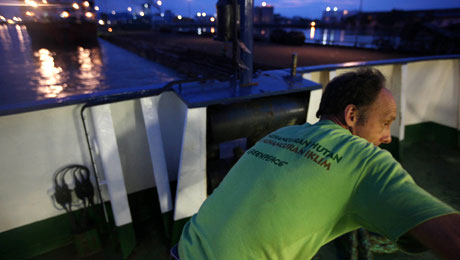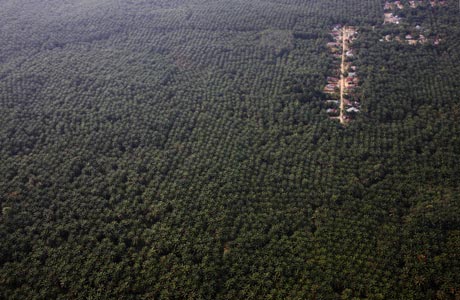Reposted from Greenpeace UK, I wrote this while I was waiting for the final stage of our multi-layered direct action in Indonesia to take place. There’s a strange state of mind you enter into during these things, particularly when they’re stretched over the best part of a week. Of course, it’s all over now and very successful it was too; the Esperanza’s tour of Indonesia is also over and I’ll be heading back to my usual haunts in London, but hopefully it won’t be the last time I’ll pop up here>

Direct actions can be quite boring at times. The few moments of excitement are the ones which make the headlines and the photos, but anyone who has participated themselves will know there can be long, drawn-out stretches when not much is happening. Direct inaction, if you will.
I’m currently experiencing that now. As I write this, nestled in the campaign office on board the Esperanza, we’re playing a waiting game. You’ve probably read about what the crew here has been up to in the Indonesian port of Dumai, painting and blockading palm oil tankers.
While all that was very worthwhile in itself, it was a build-up to where we are now – waiting in the harbour for a ship to move away from its berth so the Esperanza can nip in and take its place. That will prevent our target – the Isola Corallo – from docking and loading up with its cargo of crude palm oil, courtesy of agri-giant Sinar Mas. Hopefully by the time you read this it will be in full swing.
Short bursts of frenzied activity can of course be tiring, but so can the slow periods in between. There’s not much you can fill the time with, because you need to be ready to leap into action; you can’t relax either because you’re on standby for the same reason. And we’ve been running in this mode for almost a week: first with the big banner, then with the painting and anchor occupation, and now this.

Still, it gives me time to think about everything I’ve seen and heard in the past six weeks while I’ve been in Indonesia. About the incredible forests that still exist over in New Guinea and the companies waiting to tear them down; about the palm oil that’s pouring out of this country and the rather pathetic attempts to make it appear like there’s nothing wrong; about the local and indigenous people being trampled on in the rush to grab apparently available land; about how making forest preservation a central part of any international climate agreement is so very, very important.
I’ve been writing about Greenpeace’s forest campaign for nearly three years, but based in London it’s difficult to get a sense of how the various strands we work on – the political work, the community work, the consumer work – all link up. Being here though and working on the ship tour blog, I’ve been gradually pulling those strands together, in my own head as much as in the stories I’ve written. I understand them better now than if I’d remained behind my desk, reading press releases and campaign updates.
If I could, I’d take everyone to see the forests in Papua and Sumatra. Photos or video don’t even come close to doing them justice and being able to hear, smell and even touch the peaty, barky, humming, buzzing, verdant goodness turns them from an abstract concept in a far-off place into something real, alive and worth defending.
Most of the forests we’ve already lost have been destroyed within my lifetime, and I like to think I’m not that old. By the time I’m drawing my pension (assuming there is any pension to draw), the forests I’ve just seen could be gone. They could all be gone. Our priorities need to change: while we live by the mantra that growth is good, forests will be burnt, soils will be poisoned, oceans will be sterilised and this planet – our home – will become a much more inhospitable and dangerous place.
And so we carry on waiting. Hopefully it won’t be too much longer now.